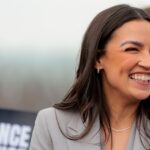
Vice President Kamala Harris‘s ascendance to the 2024 Democratic presidential nomination has shaken up the electoral map, according to Democrats.
Under President Joe Biden, battleground states Arizona and Georgia were at risk of becoming out of reach due to mounting concerns over his age despite him flipping them for the first time in decades only four years ago. But with Harris replacing him at the top of the ticket, Democrats are arguing those states, in addition to a third, Nevada, are back in play.
Tharon Johnson, a senior adviser to Biden’s 2020 campaign in Georgia, described Peach State Democrats as having their “swagger back” after Biden announced his decision not to seek reelection and to endorse Harris as his successor last weekend. Prior to the announcement, former President Donald Trump had an average 4-point advantage over Biden in the state, according to RealClearPolitics.
Harris’s early polling among white voters, particularly those without a college degree, is poised to make sure that this November’s election remains a close contest, while Rust Belt states Biden had found success in, such as Michigan, Pennsylvania, and Wisconsin, could be harder for her to win. But Democrats are betting Harris, the first black and South Asian woman to become vice president, will be able to speak to young, minority, and female voters in a way Biden, an 81-year-old white man, could not.

“Now that she’s at the top of the ticket, now she is the presidential nominee, there’s going to have to be a robust reassessment of which demographic groups will be more appealing and some that they will need to persuade,” Johnson told the Washington Examiner. “For instance, the African American support for Vice President Harris will expeditiously increase.”
“I’m not saying that President Biden did not have support in the African American community,” he said. “It’s just, I believe, going to be even more significant now that she’s at the top of the ticket, particularly with black women.”
Before the debate in Atlanta last month, University of Georgia political science professor Charles Bullock underscored that it had been “a long time” since Biden had led Trump in any Georgia poll, with Harris traveling to the state five times this year and 14 times since the start of the administration “to reel back in that black vote.”
Under Biden, Trump had made “a little bit of headway” with black voters and that was “probably” all he could have hoped for and needed “because in 2020, he got 11% of the vote, and, if he got 12%, he would have won Georgia,” Bullock told the Washington Examiner.
Johnson, the former Biden adviser, also emphasized the importance of young and “disaffected Republican college-educated women” voters to Harris in Georgia.
Biden won Georgia because “white, highly educated, affluent voters in the Atlanta suburbs moved in a pretty big way from the Republican ticket toward the Democratic ticket,” Emory University political science associate professor Zachary Peskowitz agreed.
“Stubbornly high inflation over the past year or so has led to a lot of economic anxiety and lack of confidence in economic conditions in Georgia and elsewhere, and that … unsurprisingly hurt the incumbent President Biden,” Peskowitz told the Washington Examiner.
While Harris may be able to reconnect with some of those voters over the issue of abortion access, when asked whether she would have to work to overcome Biden’s economic record, Johnson encouraged her to discuss the southern border proactively instead.
“She now has a unique opportunity to articulate to the American people, and particularly Georgia voters, about what are we going to do with this opportunity to reduce the crisis at the border,” he said. “We’ve got to call it a crisis because it is.”
For Georgia state Rep. Phil Olaleye, Biden’s problems in Georgia were about apathy and a lack of enthusiasm, which Harris could ameliorate.
“Specifically here in Georgia, where, I mean, it’s just every time you wake up, it’s election time,” Olaleye told the Washington Examiner. “There’s been a lot of fatigue and exhaustion, and that’s compounded with just the negative kind of narratives and the lack of success stories being told by the media.”
Georgia state Sen. Sonya Halpern, vice chairwoman of the chamber’s Democratic caucus, remained adamant that the Harris campaign is “in a very good position” in the state, having opened campaign offices “in places where you wouldn’t necessarily imagine.”
“If we contrast that even to 2020, this is a much more enhanced, aggressive stance for the state,” Halpern told the Washington Examiner.
Democrats are similarly excited in Arizona and Nevada, the latter of which, like Georgia, is a majority-minority state. Trump had a 6-point edge over Biden in Arizona and Nevada before the president dropped out of the race last Sunday, according to RealClearPolitics.
Arizona Democratic strategist Tony Cani insisted his state was “never out of play for Biden” and is “certainly not for Harris,” though there were “lingering questions” about the president’s age that put pressure on his polling among young and Latino voters.
“Harris as the nominee removes those doubts and puts Trump’s age instead front and center,” Cani told the Washington Examiner. “The Biden-Harris administration’s legislative achievements are very impactful for Arizonans, but just don’t know about them yet. We have a strong growing senior population that, along with their caretakers, benefited tremendously from his actions to hold down prescription drug costs. … Harris will run on those achievements.”
“One final thing on immigration,” he said. “[Sen. Kyrsten Sinema (I-AZ)] was one of the lead negotiators of the border bill that Trump killed for political reasons. Arizona voters are frustrated with gamesmanship on the border, and they know Trump is why that bill didn’t pass.”
The Trump campaign has already begun to attack Harris as Biden’s failed “border czar.” It released a memo on Tuesday acknowledging that Harris may see a bump in the polls but argued that as the newness of her campaign wears off, the fundamentals of the race give Republicans the edge.
In Nevada, a Democratic strategist in the state argued the vice president is tailor-made for its voters. The Silver State is home to “a strong population of black voters,” “one of the fastest growing AAPI communities,” and “a large swath of Latino voters,” as well as young voters.
“Nevada is one of the battleground states she’s visited the most this cycle, and she’s been to Nevada more than a dozen times as vice president,” the operative told the Washington Examiner. “That’s something that’s unique for states like Nevada and Arizona, where you have a candidate who comes from a Western state, so she’s naturally here more often.”
CLICK HERE TO READ MORE FROM THE WASHINGTON EXAMINER
Nevertheless, Harris launched her campaign in Milwaukee on Tuesday, asserting her path to the presidency runs through the Badger State.
“Wisconsin, I am told as of this morning that we have earned the support of enough delegates to secure the Democratic nomination,” Harris said. “I am so very honored, and I pledge to you I will spend the coming weeks continuing to unite our party so that we are ready to win in November.”





